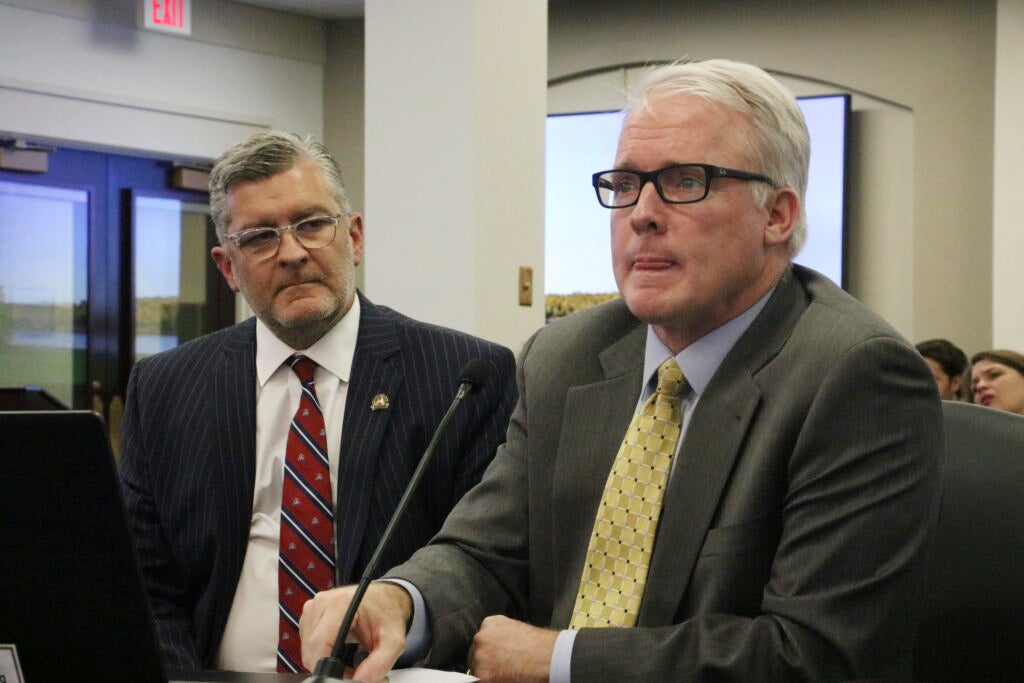Lawmakers push to keep coal on the grid
Published 4:24 pm Friday, March 3, 2023
BY LIAM NIEMEYER
The Kentucky Lantern
Kentucky lawmakers are advancing a bill to try to keep coal-fired power plants on the state’s electric grid “for the foreseeable future,” pointing to concerns over rolling blackouts that some utilities implemented when arctic temperatures swept through in December.
Senate Bill 4, sponsored by Sen. Robby Mills, R-Henderson, would prevent the Kentucky Public Service Commission (PSC) from approving a request from a utility to retire a fossil fuel fired power plant unless the “reliability and resilience of the electric grid serving Kentucky customers, including during peak demand, will not be compromised.”
Some electrical utilities serving Kentucky oppose the bill, saying it would hamstring their ability to retire uneconomical coal plants, burdening consumers with an unnecessary cost to keep paying for obsolete generators. Also, utilities say, the measure misconstrues the roles of regional grid operators and utilities in the sale of electricity.
Mills pointed to past and planned retirements of coal-fired power plants as threatening the reliability of electricity to Kentuckians, echoing comments from fellow Republicans during a hearing earlier this year about the rolling blackouts. Utility leaders during that hearing instead pointed to key components of a natural gas pipeline that froze as a cause behind the rolling blackouts.
“Coal is reliable, resilient, affordable and provides energy security for our state and our nation,” Mills said last week before the Senate Natural Resources and Energy Committee. “We all know and understand the nation’s power grid is changing, but this change must take place gradually to avoid jeopardizing the reliability of our grid.”
Utilities across the country are increasingly retiring coal-fired power plants, with a quarter of the nation’s coal power plant fleet scheduled to be shut down by 2029, according to the Energy Information Administration.
In Kentucky, the Tennessee Valley Authority — a federally-owned utility that isn’t regulated by the state PSC — plans to retire its entire coal-fired power plant fleet by 2035 and replace it in part by burning natural gas. Louisville Gas and Electric and Kentucky Utilities (LG&E and KU) also is requesting to retire some of its coal plants to also be replaced by natural gas and solar.
The state currently gets the large majority of its power by burning coal, the most harmful electricity source in terms of carbon dioxide emissions that contribute to climate change. Leading climate researchers working with the United Nations have recently warned that to meet global temperature goals set forth in the Paris Agreement to limit the catastrophic effects of climate change, the world needs a “rapid global transformation of the power system,” the largest global source of carbon dioxide emissions according to the International Energy Agency.
Lane Boldman, executive director of the statewide environmental advocacy coalition Kentucky Conservation Committee, said the legislation “doesn’t really get us any closer to a viable energy transition.” The group strongly opposes the bill.
“It’s not forward looking, and if they want to really address the reliability problem, they should be looking at how to be integrating other sources such as wind and solar, in ways that shore up the reliability, because the reality is, on many of these coal plants, they’re simply at the end of their lifecycle,” Boldman said.
Utilities protest an “untenable position”
Lawmakers did not bring up any considerations of climate change during the meeting of the Senate Natural Resources and Energy Committee.
Utility representatives did bring up what they see as the potential cost consequences of the legislation. Duke Energy Kentucky Deputy General Counsel Rocco D’Ascenzo told lawmakers that the utility “would not be able to close a fossil fuel plant” under the bill.
“That isn’t hyperbole,” D’Ascenzo said. “The bill would force our Northern Kentucky customers to continue to pay into perpetuity the operation, maintenance costs as well as incremental capital investments that we may have to make for a plant that is no longer burning any fossil fuels and not producing any energy.”
D’Ascenzo said a potential “impossible hurdle” in the bill would require the state Public Service Commission to have regional grid operators, such as the multi-state PJM Interconnection, affirm that such retirements “would not increase the risk of forced curtailments to retail customers during periods of peak demand.”
He said the bill language puts utilities seeking future retirements in an “untenable position” because it misinterprets the role regional grid operators play in the electricity market.
Such grid operators regulate the “wholesale” electricity market and do not sell electricity to “retail” customers like homes and businesses. Local utilities, such as Duke Energy Kentucky, usually sell electricity directly to consumers. Therefore, D’Ascenzo said, the bill language puts a requirement on larger grid operators regarding the retail electricity market that they have “no authority, obligation or capability to make.”
“This requirement places Kentucky’s utilities that are in a (regional transmission organization) in the untenable position where a retirement decision — no matter how justified as part of a lease cost, most reliable and efficient resource plan — could never pass muster,” he said.
Kent Blake, the chief financial officer for LG&E and KU, added in testimony that while utility leaders appreciate the concerns about reliability, the bill fails to take into account the costs of operating coal plants.
“We bring a case forward that says, ‘Now is the time to retire a given coal-fired unit.’ You can believe that now is the time. That’s what our very extensive analysis would show,” Blake said.
Blake also mentioned the state PSC already had “broad powers” to examine utilities’ service. Utilities are required every three years to present a plan to the PSC regarding how to provide “adequate and reliable” electricity service into the future at the “lowest possible cost.”
As of earlier this month, investor-owned utilities in the state — LG&E and KU, Duke Energy Kentucky and Kentucky Power Company — have launched a website and social media pages lobbying against the legislation under the name “Kentuckians for Affordable & Reliable Energy.”
“It’s just to raise awareness and ensure that our customers understand the importance of this issue,” said Chris Whelan, an LG&E and KU spokesperson.
A report in January from the nonpartisan research group Energy Innovation Policy and Technology LLC found that 99% of all coal-fired power plants across the country, including all operating plants in Kentucky, were more expensive to operate than new solar or wind installations.
The report authors said the clean energy tax credits that were expanded under the federal Inflation Reduction Act play a sizable role in ensuring cost advantage of renewables over coal, though cost isn’t the only aspect to consider with transitioning from coal.
“(I)n some regions one-to-one replacement with a combination of wind and solar resources may not adversely affect reliability. In others it may, depending on what other resources are serving the power grid,” the report states. “Many communities also depend on coal plants for jobs and tax revenue. In addition to reliability value, policymakers must consider the potential of replacement energy resources to provide similar economic value.”
Some grid operators have previously expressed concerns about future electricity reliability out of concerns the energy supply is moving too rapidly to greener energy sources without the complementary battery infrastructure needed to store energy from wind or solar, which produce energy intermittently throughout the day.
Mills, the bill sponsor, said he ultimately wants the economics of fossil fuels to be given a fair shake compared to renewable energy and that the remaining fossil fuel resources in the state be utilized until it’s “100% used up.”
“We got to be able to prove that and to really have a fair, intellectual debate about renewables versus fossil fuels,” Mills said. “We’ve got to be able to show what fossil fuels can do with new equipment, new technology and new scrubbing versus new renewables.”







